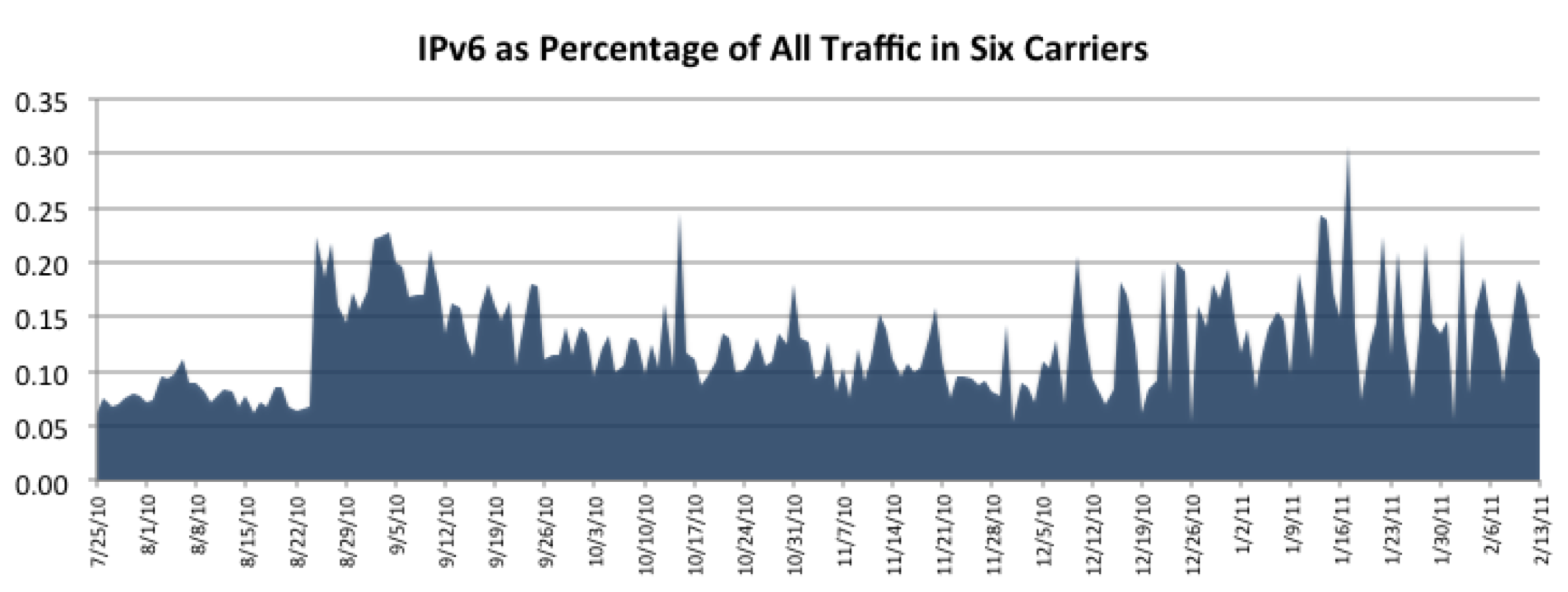Internet IPv6 adoption is going no-where fast


It's not like the Internet has stopped growing. Far from it. Akamai, a major content delivery network (CDN), reports, "In the first quarter of 2011, over 584 million unique IP addresses, from 237 countries/regions, connected to the Akamai network - 5.2% more IP addresses than in the fourth quarter of 2010, and 20% more than in the first quarter of 2009. Although we see more than half a billion unique IP addresses, Akamai believes that we see well over one billion Web users. This is because, in some cases, multiple individuals may be represented by a single IP address (or small number of IP addresses), because they access the Web through a firewall or proxy server. Conversely, individual users can have multiple IP addresses associated with them, due to their use of multiple connected devices."
And, let me remind you that that estimated billion is just for those who've connected through Akamai to make a Mac OS X Lion download or watch a video. We're closing quickly in on IPv4's hard limit of 4.3-billion. Indeed, according to ABI Research our smartphones and tablets alone will hit the one billion IPv4 mark in 2011.
So, we're all moving as fast as we can to IPv6 right? Of course not.
Despite the recent IPv6 World Day demonstration, which showed that our IPv6 technologies are ready to go and that they can live and work with IPv4, we're not moving quickly at all to the next generation of the Internet.
Sure, you can delay moving to IPv6 by buying IPv4 address blocks. Microsoft, for example, did that by buying Nortel's IPv4 addresses for $7.5-million, via the IPv4 broker Addrex, earlier this year.
John Curran, CEO of the American Registry for Internet Numbers (ARIN), believes though that "At some point in the not-too-distant future, it will become more cost-effective for most users to acquire and use free IPv6 addresses than to buy legacy addresses, and the bottom will quickly fall out of the IPv4 after-market."
Well, it's not happening yet. Akamai found of "the top one million Web sites as ranked by Alexa [a Website analysis company]. ... IPv6 reachability of these sites appeared to remain fairly constant at approximately 0.25% through the first half of the quarter but jumped suddenly to the 3% range in mid-February." A closer look revealed though that "this increase in reachability was due to Google "white-listing" Comcast for IPv6 connectivity - as a result, the Comcast monitor was able to reach many blogspot.com hosts over IPv6" Blogspot.com is Google Blogger's domain name for blogs. "Without these blogspot site results, "then IPv6 reachability at the end of the quarter would be approximately 0.3%,"
Akamai also reported that the Internet security firm Arbor Networks, which has also studied IPv6 adoption and associated traffic levels has found that the "aggregate IPv6 traffic volumes generally ranged between 0.1 and 0.2 percent of Internet traffic."
Put it all together, and it's clear, we are so, so not ready for the day when we run out of IPv4 addresses. If you're a home user, don't worry about this. If you're a CIO or a network manager though, it's way past time to be telling your CFO and CEO to put some more money in the 2012 IT budget for upgrading your Internet infrastructure. You're going to need it.
Related Stories:
The World IPv6 Day report card
Want to buy an Internet IPv4 address? Cheap?
It's official: Asia's just run out of IPv4 Addresses
Cisco aims to defend core switching business, updates Catalyst 6500